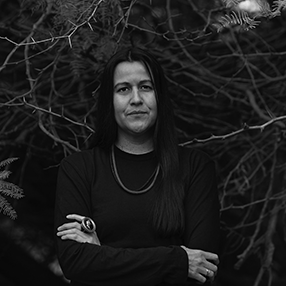Grief Work
I have gazed the black flower blooming
her animal eye. Gacela oscura. Negra llorona.
Along the clayen banks I follow her-astonished,
gathering grief’s petals she lets fall like horns.
Why not now go toward the things I love?
Like Jacob’s angel, I touched the garnet of her wrist,
and she knew my name. And I knew hers—
it was Auxocromo, it was Cromóforo, it was Eliza.
It hurtled through me like honeyed-rum.
When the eyes and lips are touched with honey
what is seen and said will never be the same.
Eve took the apple in that ache-opened mouth,
on fire and in pieces, from the knife’s sharp edge.
In the photo her fist presses against the red-gold
geometry of her thigh. Black nylon, black garter,
unsolvable mysterium—I have to close my eyes to see.
Achilles chasing Hektor round the walls of Ilium
three times. How long must I circle
the high gate above her knees?
Again the gods put their large hands in me,
move me, break my heart like a clay jar of wine,
loosen a beast from some darklong depth—
my melancholy is hoofed. I, the terrible beautiful
Lampon, a shining devour-horse tethered
at the bronze manger of her collarbones.
I do my grief work with her body—labor
to make the emerald tigers in her hips leap,
lead them burning green
to drink from the violet jetting her.
We go where there is love, to the river,
on our knees beneath the sweet water.
I pull her under four times
until we are rivered. We are rearranged.
I wash the silk and silt of her from my hands—
now who I come to, I come clean to, I come good to.
Copyright © 2015 by Natalie Diaz. Originally published in Poem-a-Day on April 21, 2015, by the Academy of American Poets.
“My friend and I call grief the beautiful terrible because it is a wound that opens you but also shows you the miracles of what is inside you. Rather than try to escape my griefs, I’m trying to recognize them as a wildness I can submerge myself in, to be washed clean by the very thing that aches me so deeply. To give my grief to a beloved’s body, to take her grief into my body, to rearrange ourselves with it and become both more and less of one another and of our own selves—this is a lucky thing.”
— Natalie Diaz

